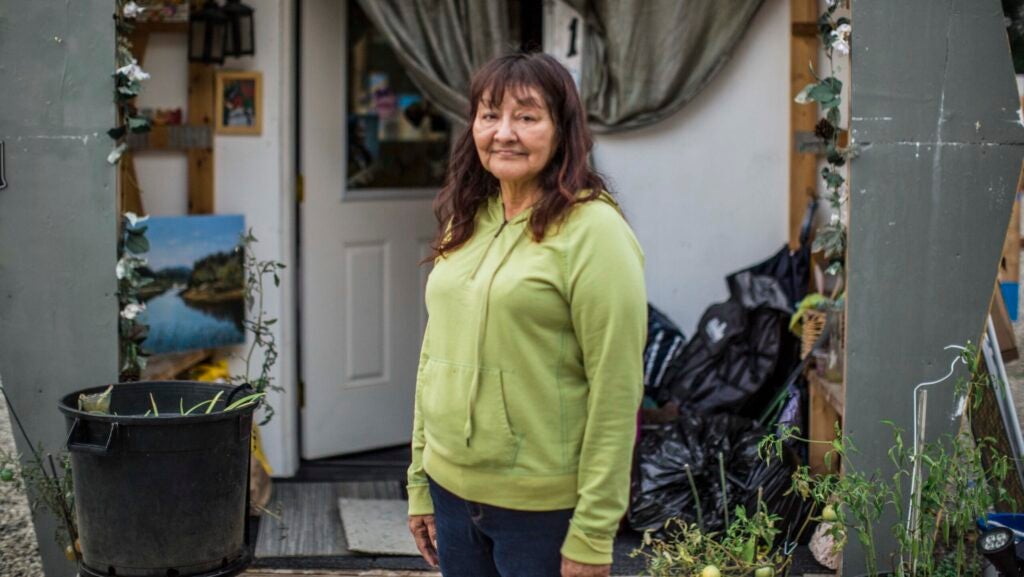

Since opening two years ago, the Kenton Women’s Village, which offers shelter for women experiencing homelessness on the streets of Portland, Oregon, has helped 24 women move into permanent housing.
What is the cause of this success? Rose Bak, director of homeless and housing services at Catholic Charities of Oregon, said it comes with community involvement.
Catholic Charities of Oregon, which provides direct services and case management to the residents of Kenton Women’s Village, works with two very important community partners: the Joint Office of Homeless Services of Multnomah County (JOHS) and the citizens of Portland, the county seat.
In 2016, JOHS began a community-wide goal-setting process. One of the goals was a better option for homeless women. Traditional shelters or homeless camps serve both men and women, but women on the streets often forgo these accommodations out of fear of violence from the men.
“Most women,” Bak said, “become homeless because of domestic violence at the hands of husbands and boyfriends. That’s the number one reason.” So being in proximity to men makes the women feel unsafe.
JOHS partnered with Catholic Charities, which has years of experience serving the homeless population, to focus on a shelter for women. The two organizations settled on the Kenton neighborhood, where a significant number of women lived on the streets. But the organizations still needed the Kenton residents’ stamp of approval, which did not come immediately.
“Just like anywhere in the country where you want to put a facility [that helps homeless people],” Bak said, “when we first started talking about it, the neighbors were really worried. Were there going to be sex offenders? Was crime going to go up? Were there going to be needles everywhere?”
In response, Catholic Charities and JOHS talked with Kenton residents and developed a “good neighbor agreement.” They promised to do a number of things: to have on-site staffing, to screen for sex offenders, and to prioritize homeless women who were already in the neighborhood.
“We also just started bringing folks in [to understand what we do],” Bak said. “People came in and made meals. They came in and helped with gardening. And they got to know the women and heard their stories and saw their experiences, and the fear factor went away. They became so invested in this village.”
The Kenton Women’s Village consists of individual pods, which are the size of a backyard shed. Each pod contains a bed and some shelves for storage. The village also provides shared bathrooms and a kitchen area. The village is meant to be transitional housing, and the staff are focused on moving the women into permanent housing.
“We set out very specifically to have intensive services on-site,” Bak said, “so that women didn’t have to take a bus to go to various appointments. We wanted to bring services to them.”
A team of two full-time staff, two part-time workers and a group of volunteers focus on four domains to help residents remain off the streets: housing stability, income stability, social connection and mental health.
The simple move into a stable structure sets the path toward permanent housing. Dealing with trauma from domestic violence, trying to hold down a job or even maintaining relationships become doubly difficult without a place to live.
Once a woman enters the Kenton Women’s Village, she takes about a month to simply rest and get caught up on sleep. Residents meet once-a-week with staff in order to address issues like trauma and/or addiction. They take classes on job interviews, cleaning up credit and how to access government benefits. Since being homeless is very isolating, the residents also have group meetings and activities in order to increase their social interactions.
As time goes by, some of the women begin working at jobs or achieve some other personal goal. According to Bak, the average time it takes for a resident to move into permanent housing is six months, which may seem very fast to a public not familiar with homeless people.
“Some people think that the homeless aren’t motivated to do things,” Bak said. “But once you have hope and you have some direction, things move more quickly.”
The women who have benefitted from the Kenton Women’s Village would agree. They give thanks for the hope and direction offered to them by Catholic Charities, JOHS, and their Kenton neighbors. Their gratitude even spurred them to do something for others.
Bak said that some months ago a bounty of donations had come to the village, so much so that the storage capacity was reached. The residents decided to make hygiene gift bags and distribute them on the streets. One resident said, “It felt good to give back and give hope to the women out there, to let them know there were other options.”
There’s the old saying: success breeds success. Perhaps other communities, inspired by the Kenton Women’s Village, will work together to provide hope to the homeless women in their neighborhoods.








